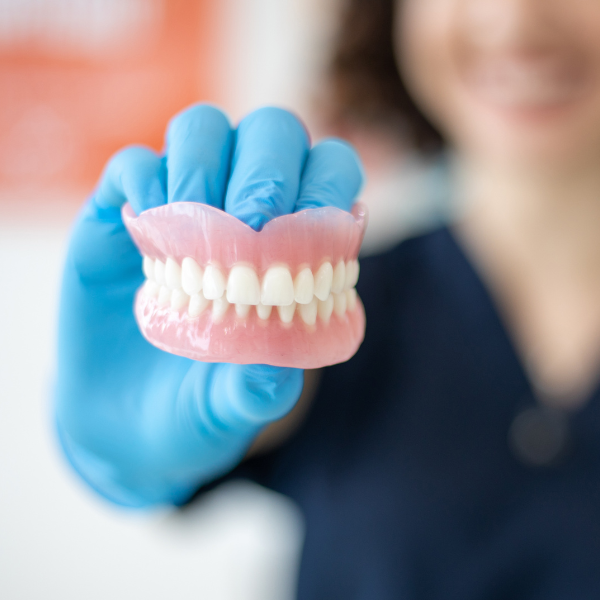Dentures Near You
Have you ever thought about dentures and why they are essential for restoring patients’ oral health and function?
Although this treatment frequently receives a lot of humorous attention, dentures are a reliable solution to missing teeth, giving wearers the confidence they deserve to get back out and enjoy daily life. If this is something you’re interested in learning more about, please contact our dentist in Dacula today.
What Issues
Can Dentures Solve?
When you’re missing teeth, many everyday activities become challenging, leading to frustration and negatively impacting oral and overall health. Fortunately, dentures can be custom-made to meet your specific needs, whether you’re missing a few teeth or all of them.
Outlined below are just a few of the many issues that acquiring dentures can help you effectively address:
- Discomfort while biting and chewing
- Difficulty speaking clearly
- The aesthetic appearance of your smile
- Jaw bone deterioration
- Premature facial sagging
- Teeth from shifting out of place

You must schedule and attend a consultation with a dentist or denturist to determine if you’re an ideal candidate for dentures. If dentures aren’t suitable for your situation, they will discuss with you to identify an equally reliable alternative.
Types of Dentures You Can Receive
The two most common types of dentures in Dacula are partial and full dentures.
Partial dentures are designed to replace multiple missing teeth, while full dentures are used to restore smiles where all teeth are missing. Full dentures can be provided immediately or may require a few weeks to be custom-made at a dental lab, depending on your needs. The latter option is often chosen for patients who undergo tooth extraction before receiving dentures.
If you have any questions or concerns about the denture process, it’s important to discuss them with your dentist. They can provide you with guidance and information tailored to your specific situation.
When it’s time for your appointment, impressions of your smile will be taken to ensure your dentures fit comfortably and securely. If your permanent dentures need to be fabricated, you may receive temporary ones in the meantime. During a follow-up session, you’ll receive your dentures and your dentist will ensure they fit correctly and meet your expectations. It may take several visits and adjustments to achieve the ideal fit and comfort.
Who is a Candidate for Dentures?
- Complete Tooth Loss:
Individuals who have lost all of their natural teeth, either in the upper jaw, lower jaw, or both, may be candidates for complete dentures. Complete dentures replace an entire set of missing teeth. - Partial Tooth Loss:
If a person has some remaining natural teeth but has lost several others, partial dentures may be considered. Partial dentures fill in the gaps created by missing teeth and can be removable or fixed with the support of adjacent natural teeth or dental implants. - Decayed or Diseased Teeth:
Patients with extensive tooth decay, periodontal disease, or other oral health issues that compromise the functionality and stability of their teeth may be candidates for dentures. In some cases, extracting the remaining compromised teeth and opting for dentures may be a viable solution. - Difficulty Chewing or Speaking:
Individuals experiencing difficulty in chewing food or speaking clearly due to missing teeth may benefit from dentures. Dentures restore the ability to chew and improve speech, enhancing overall quality of life. - Cosmetic Concerns:
People with significant cosmetic concerns related to missing teeth may opt for dentures to improve their smile and facial appearance. Dentures can provide a natural-looking and aesthetically pleasing result. - Health Considerations:
Certain health conditions, such as advanced diabetes or cardiovascular issues, may impact the feasibility of other tooth replacement options like dental implants. Dentures can be a suitable alternative for individuals with specific health considerations. - Financial Considerations:
Dentures are often a more cost-effective option compared to some other tooth replacement alternatives. For individuals with budget constraints, dentures can provide a functional and esthetically acceptable solution.
It’s crucial for individuals considering dentures to consult with a dentist for a comprehensive evaluation. The dentist will assess overall oral health, evaluate the condition of remaining teeth, and discuss the most suitable type of denture based on the individual’s specific needs and circumstances. Furthermore, advancements in dental technology have resulted in more comfortable and aesthetically pleasing denture options for patients.
Ready to Repair Your Smile?
Are you ready to begin your restorative dental journey? Contact us at Lanier Valley Dentistry today! Our team is committed to helping you achieve your ideal smile. No matter the challenge, we’re here to assist you every step of the way. We look forward to working with you soon!
📍 Find us easily on the Google map and plan your visit today!
Frequently Asked Questions About Dentures
What are dentures?
Dentures are removable dental prosthetics designed to replace missing teeth and surrounding tissues. They are available in two primary types: complete dentures, which are used by individuals who have lost all their natural teeth, and partial dentures, which are designed for those who still have some natural teeth remaining.
How long do dentures last?
The lifespan of dentures varies depending on factors such as the type of denture, oral hygiene practices, and changes in the jawbone over time. On average, dentures may last 5 to 10 years before requiring adjustments or replacement.
Are dentures comfortable to wear?
With proper adjustments and a period of adaptation, dentures can be comfortable to wear. It’s common for new denture wearers to experience an adjustment period, during which the dentures may feel slightly uncomfortable. Regular dental check-ups can help address any fit issues.
Can I eat normally with dentures?
While there is an adjustment period for eating with dentures, many individuals can resume normal eating habits. Initially, it’s recommended to start with softer foods and gradually reintroduce a regular diet. Chewing efficiency often improves as the wearer becomes accustomed to the dentures.
How do I care for my dentures?
Proper denture care includes daily cleaning with a denture brush or soft toothbrush, using a mild soap or denture cleaner. Dentures should be removed at night to give the gums a chance to rest. Regular dental check-ups are essential to monitor the fit and overall oral health.
Can dentures be stabilized with dental implants?
Yes, dentures can be stabilized and supported by dental implants through a procedure called implant-supported dentures. Dental implants offer increased stability, help prevent bone loss in the jaw, and improve the overall functionality and comfort of the dentures.



 678-802-1209
678-802-1209 Request Consultation
Request Consultation
